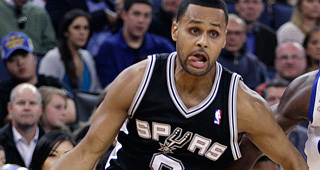The 2012 London Olympics didn't bring many surprises and was quite predictable as all favorites made it to the quarterfinals and the world's two best teams, the United States and Spain, won the gold and silver respectively. However, many players, despite their team success, struggled to reach expectations while others unexpectedly were very productive.
Surprises:
Patrick Mills (Australia): 21.2 points, 4.5 rebounds and 2.2 assists per game.
Best performance: 39 points (5-for-7 on 3-pointers) and 5 rebounds in 30 minutes against Great Britain.
It was no surprise that Patrick Mills, who turned 24 last week, was Australia's clear leader. But few nobody expected to see the 6-foot point guard as the top scorer in the Olympics with an average of 21.2 points per game. Also, Mills was consistent as never before as he finished all six games in double-digit points.
Joe Ingles (Australia): 15 points, 5 rebounds and 4.2 assists per game.
Best performance: 19 points, 8 rebounds and 6 assists in 40 minutes against United States.
Joe Ingles was one of the most efficient and versatile players in the Olympics. Ingles led the Boomers against bronze medal winners Russia with 20 points effort and was very consistent throughout the tournament. Ingles is also only 24, making the future of Australia very promising especially if Andrew Bogut is healthy for future tournaments.
Nate Reinking (Great Britain): 9.2 points, 1.6 rebounds and 1.2 assists per game.
Best performance: 13 points and 3 rebounds in 32 minutes against Brazil.
Even at 38, Nate Reinking of Great Britain was still a useful tool on offense. As he did last year in EuroBasket 2011, Reinking averaged 9.2 points per game and was third in scoring behind two NBA players, Luol Deng and Joel Freeland, amongst all Great Britain players. More impressive, Renking is not sure about his retirement and might play for Great Britain agan next year.
Darius Songaila (Lithuania): 11 points and 3.5 rebounds per game.
Best performance: 15 points, 5 rebounds and 3 steals in 20 minutes against Russia.
Before the Olympics began, most Lithuanian basketball fans thought Darius Songaila would not make it to the final roster, seeing young talent Donatas Motiejunas replace an old veteran. However, as Motiejunas refused to join the national team, Songaila got a chance to prove he has a few productive years remaining in his career. Moreover, a after great performance in the Olympics, Songaila even started talking about making a return to the NBA.
Salah Mejri (Tunisia): 10.4 points, 10 rebounds and 3.4 blocks per game.
Best performance: 19 points, 14 rebounds and 7 blocks in 37 minutes against Argentina.
Salah Mejri of Tunisia had a slow start against Nigeria and the United States, but then overcame expectations and became a dominant big man in the paint. The 7-foot-1 Mejri had a monster performance against Argentina, where he scored 19 points, grabbed 14 rebounds and blocked seven shots. Mejri probably didn't even expect to finish the Olympics as the leading shotblocker and second in rebounds.
Disappointments:
Matt Nielsen (Australia): 3.3 points, 3.5 rebounds and 2 turnovers per game.
Worst performance: 0 points, 5 rebounds, 4 fouls and 4 turnovers in 18 minutes against China.
The best years of the 34-year-old Matt Nielsen are certainly behind him, but his performance in the London Olympics was way below his capabilities. It was the worst international tournament for Nielsen in his career as he never scored more than seven points or grabbed five rebounds in all six games. Nevertheless, Nielsen signed an extension from Khimki Moscow region this summer, believing the 6-foot-10 veteran has enough fuel left in the tank.
Ronny Turiaf (France): 3 points and 5.2 rebounds per game.
Worst performance: 0 points, 4 rebounds and 5 fouls in 17 minutes against Spain.
France lacked size in this Olympics and Ronny Turiaf was one of the guys who had to step up and be a leader in the paint. However, Turiaf didn't play as an NBA champion and was very inconsistent. Turiaf was very efficient against Lithuania, but later simply disappeared in a quarterfinal game against Spain.
Jonas Valanciunas (Lithuania): 4.2 points, 4 rebounds and 0 assists per game.
Worst performance: 0 points, 6 rebounds and 3 turnovers in 12 minutes against Tunisia.
After Lithuania's starting center Robertas Javtokas was ruled out for the Olympics, Jonas Valanciunas was expected to receive more minutes and have a positive influence upon his team's inside game. As usual, expectations were sky high for the 20-year-old Valanciunas after his great debut in EuroBasket 2011. But for the first time in his career, there was more bad than good in Valanciunas' game.
Al-Farouq Aminu (Nigeria): 7.8 points, 6 rebounds and 2.8 assists per game.
Worst performance: 0 points (0/5 FG), 3 rebounds and 3 turnovers in 27 minutes against France.
Overall, Al-Farouq Aminu had a pretty good tournament and his statistics prove that. For example, he finished second in steals with an average of two per game. However, the 21-year-old Aminu was dominant in Olympic qualifying tournament and demonstrated how unstoppable he can be at times. In contrast, Aminu never showed that type of game in the Olympics.
Sergey Monya (Russia): 4.9 points and 3.8 rebounds per game.
Worst performance: 2 points, 2 rebounds and 3 turnovers in 23 minutes against Argentina.
The 29-year-old Sergei Monya will always be one of those players who never lives up to his expectations. Despite huge Russian success in the Olympics, the former NBA player had a very average tournament, averaging almost fuve points and four rebounds. It seems Monya has reached his peek and won't ever become more than just a role player.



